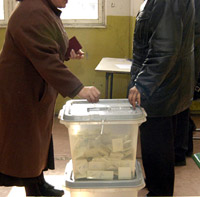It seems as though the Bible with its Ten Commandments and the entire legislature is enough to regulate human relations. In other words, in order for a person, especially if he is a functionary or a deputy candidate, not to cheat, steal or commit electoral fraud, it is enough for him to get acquainted with the Ten Commandments of the Bible and in the extreme, Armenian legislation, and that’s it. However, since God Almighty is invisible and Aghvan Hovsepyan is far away, there is a need for fresh norms to regulate human instincts especially before the elections. The Dashnaktsutiun did this before the parliamentary elections back in 2003. The Dashnaks pretended that they knew nothing about the fraudulent elections and were a political party in love with fair elections in front of a public that had just come back to its senses after the globally fraudulent presidential elections. The Dashnaks proposed a memorandum text to the other political parties calling on resisting the temptation to commit fraud in favor of their own parties during the parliamentary elections. It is understandable that not many believed the Dashnaks and the memorandum was not signed.
We are certain that if the memorandum was to be signed, it would remind us of the famous Jewish joke when the blacksmith persuades each of his students to bring a glass of wine from their house and fill the cask. The next day each of the students empties his glass of wine in the cask, but when they try it, it turns out that there was only water in the cask.
It seemed as though the institution of memorandum signing was not vital in Armenia, however Hayrapet Hayrapetyan, who is owner of the “Hayastan” department store and “Prosperous Armenia” party candidate nominated in the 4th precinct in the majority electoral system, recently proposed his competitors to sign a memorandum according to which the candidates would be obligated to not commit fraud during the elections. But the motive for presenting the memorandum in both cases is distrust; not believing in the competitors’ honesty. It is understandable that the person presenting the memorandum is not an angel either. The charm of the memorandum is perhaps that it doesn’t have any legal power or legal consequences. It simply stupefies the senses of the other side, forms public opinion on the party presenting the memorandum or the high moral image of the party candidate. Perhaps it is not suitable, but speaking of the formality of the abovementioned memoranda, it would be insincere not to refer to the “Rule of Conduct” proposed to Armenian journalists.
It was presented by the Yerevan Press Club. Based on the “Rule of Conduct”, the presses that have signed it have been obligated to accept the following principles: “precision and subjectivity which presupposes checking the assertion of any information from any source before publication, not to slur over or distort the facts, not to publish false information”. The “editorial independence” subchapter states that “editors must be able to resist the pressures of mass media owners, sponsors and advertisers to throw light on events taking place”. There is no doubt about the honest incentives of the authors of the “Rule of Conduct”, however this is yet another formal norm of the abovementioned memoranda and the presses can not fulfill many of the principal points. We understand that president of the Yerevan Press Club Boris Navasardyan doesn’t share this opinion.
“Presses are proposed a collection of rules called the “Rule of Conduct” with the purpose of avoiding complaints, distrust or trials and they are obligated to follow the rules. In case of violating those rules, the presses that have agreed to the “Rule of Conduct” have chosen a formal manner: a non-formal body has been formed that is ready to observe all complaints and give its conclusions, and if the complaint is considered substantial, the body will present its conclusion, which will be published in the newspaper edition that has violated the “Rule of Conduct”. That will lead to the increased trust towards presses.”
Boris Navasardyan added that in many cases, respect towards the law doesn’t depend on the media. Police and tribunals are consistent on law enforcement and their decisions are not always just.
“In this case, the press takes on the responsibility of solving any issue between itself and the citizen of the public. This is an alternative solution to solving issues and settling debates; the same goes for the case of moral norms. Complying with moral norms is the individual’s moral issue-he may comply with them and may not. What about the results? There are no practical results. People may show disrespect towards each other and that happens in Armenia nowadays based on different surveys.”
Mr. Navasardyan asked not to compare the abovementioned memoranda with the “Rule of Conduct”.
“Although I do have a positive attitude towards those memoranda because if any political activist or party proposes some rules, such as conduct of a fair election campaign, the publication of that rule may play a reserved role for the given political activist and his competitors–if, of course, he is honest and his competitors join the initiative. Unfortunately, we know very well that in many cases similar memoranda are false, formal, and just one of the ways of the election campaign. The person proposing the memorandum wants to send a message that he is honest when in reality he is not. I know for a fact it is not worth comparing your mentioned memoranda with our “Rule of Conduct”. Our initiative is honest.”
There is no need to search new means of encouraging morale before or after the elections-it will not work just as contracts and memoranda will not work.

